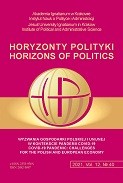KIlka uwag o aktualności etyki Sokratejskiej w dobie procesów globalizacji
Some Remarks on Topicality of Socratic Ethics at a Time of Processes of Globalisation
Author(s): Sebastian ŚpiewakSubject(s): Ethics / Practical Philosophy, Globalization
Published by: Uniwersytet Ignatianum w Krakowie
Keywords: Socrates; globalisation; ethics; dialectics; elenchos;
Summary/Abstract: RESEARCH OBJECTIVE: The main purpose of this paper is to consider the topicality of the Socratic ethical project in the context of the current debate on the problems and threats of globalisation processes. THE RESEARCH PROBLEM AND METHODS: The idea that there is any kind of compatibility between Socrates’ thought and the challenges brought on by globalisation, which seem to go far beyond the scope of his considerations, may be regarded as problematic. To give plausibility to this idea, a comprehensive research method will be used, which will combine the following aspects: a historical and philosophical analysis of accounts of Socrates’ life and teaching; a contextual analysis to reveal the historical and cultural background of Socratic ethics. THE PROCESS OF ARGUMENTATION: An outline of Socrates’ dialecti cal method in its negative aspect as well as the historical and cultural context of his philosophy are given. The aporetic and elenctic elements of his method can be regarded as offering a third path for an ethics that wants to avoid the two extreme positions present not only in his own epoch but also today: 1) an uncritical trust in tradition, leading to the conviction about the power of one’s own values and the right to impose them on others; and 2) relativism, denying the possibility of any universal approach to morality. RESEARCH RESULTS: The critical project of Socrates philosophy was sup posed to be a remedy to ethical problems regardless of historically changing conditions in which those problems were formulated. However, the negative dimension of the Socratic method is a considerable obstacle if we want to apply this form of philosophical discussion in a world like ours, where fundamental cultural differences play a significant role. CONCLUSIONS, INNOVATIONS, AND RECOMMENDATIONS: Further research on the applicability of Socratic ethics in the context of globalisation is required. Future considerations should focus on anthropological and, above all, pedagogical dimensions of Socrates’ philosophy.
Journal: Horyzonty Polityki
- Issue Year: 12/2021
- Issue No: 40
- Page Range: 181-201
- Page Count: 21
- Language: Polish

